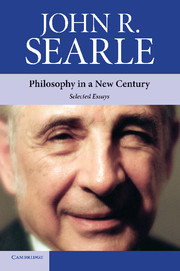Book contents
- Frontmatter
- Contents
- Original place of publication of the essays
- Introduction
- 1 Philosophy in a new century
- 2 Social ontology: some basic principles (with a new addendum by the author)
- 3 The Turing Test: fifty-five years later
- 4 Twenty-one years in the Chinese Room
- 5 Is the brain a digital computer?
- 6 The phenomenological illusion
- 7 The self as a problem in philosophy and neurobiology
- 8 Why I am not a property dualist
- 9 Fact and value, “is” and “ought,” and reasons for action
- 10 The unity of the proposition
- Name index
- Subject index
- References
8 - Why I am not a property dualist
Published online by Cambridge University Press: 05 June 2012
- Frontmatter
- Contents
- Original place of publication of the essays
- Introduction
- 1 Philosophy in a new century
- 2 Social ontology: some basic principles (with a new addendum by the author)
- 3 The Turing Test: fifty-five years later
- 4 Twenty-one years in the Chinese Room
- 5 Is the brain a digital computer?
- 6 The phenomenological illusion
- 7 The self as a problem in philosophy and neurobiology
- 8 Why I am not a property dualist
- 9 Fact and value, “is” and “ought,” and reasons for action
- 10 The unity of the proposition
- Name index
- Subject index
- References
Summary
I have argued in a number of writings that the philosophical part (though not the neurobiological part) of the traditional mind-body problem has a fairly simple and obvious solution: all of our mental phenomena are caused by lower-level neuronal processes in the brain and are themselves realized in the brain as higher-level, or system, features. The form of causation is “bottom up,” whereby the behaviour of lower-level elements, presumably neurons and synapses, causes the higher-level or system features of consciousness and intentionality. (This form of causation, by the way, is common in nature; for example, the higher-level feature of solidity is causally explained by the behaviour of the lower-level elements, the molecules.) Because this view emphasizes the biological character of the mental, and because it treats mental phenomena as ordinary parts of nature, I have labelled it “biological naturalism.”
To many people biological naturalism looks a lot like property dualism. Because I believe property dualism is mistaken, I would like to try to clarify the differences between the two accounts and try to expose the weaknesses in property dualism. This short paper then has the two subjects expressed by the double meanings in its title: why my views are not the same as property dualism, and why I find property dualism unacceptable.
- Type
- Chapter
- Information
- Philosophy in a New CenturySelected Essays, pp. 152 - 160Publisher: Cambridge University PressPrint publication year: 2008
References
- 3
- Cited by



